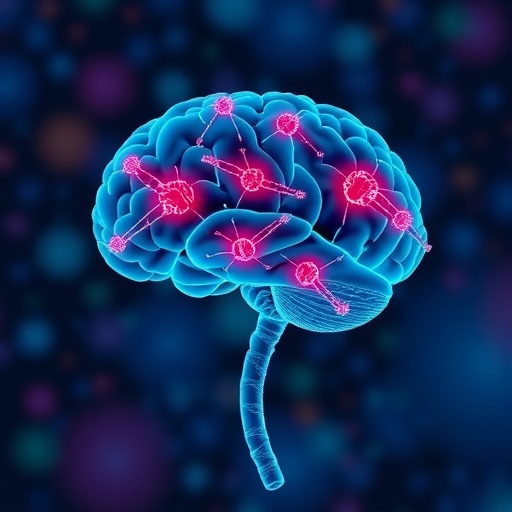Recent advances in the field of medicine have revealed the intricate connection between the gut microbiota and the brain, known as the microbiota-gut-brain axis. This emerging area of study has opened up exciting possibilities for the prevention and treatment of pediatric neurodevelopmental disorders – a category that spans a range of troubling conditions affecting a child’s cognitive, social, and emotional development. In this context, researchers, including Alkuwaiti et al., aim to harness the potential of this complex relationship to design innovative therapeutic strategies that could significantly impact the well-being of affected children.
The microbiota-gut-brain axis refers to the bidirectional communication system linking gut microbiota, the gastrointestinal tract, and the central nervous system. The human gut houses trillions of microorganisms that play critical roles in digestion, immunity, and even neural function. Recent studies have shown that these microorganisms can influence brain activity and behavior, revealing a symbiotic relationship that could be pivotal in understanding neurodevelopmental disorders. Researchers emphasize that alterations in gut microbiota composition might correlate with the onset of conditions such as autism spectrum disorders (ASD), attention deficit hyperactivity disorder (ADHD), and other developmental delays.
Crucial to this exploration is the recognition of how microbiota influences neurotransmitter production, immune responses, and systemic inflammation. For instance, certain gut bacteria are known to produce short-chain fatty acids (SCFAs), which serve as key signaling molecules that can affect neuronal function and inflammatory pathways in the brain. Given this knowledge, interventions that aim to modulate gut microbiota – such as probiotics, prebiotics, and dietary modifications – hold promise as potential therapeutic approaches for managing pediatric neurodevelopmental disorders.
Research methodologies employed in the study conducted by Alkuwaiti and colleagues are noteworthy for their rigor and innovative nature. The scientists conducted systematic reviews and meta-analyses of existing literature, integrating findings from both animal models and human clinical trials. Such comprehensive analyses not only validate the therapeutic potential of manipulating gut microbiota but also highlight the necessity for precision in treatment protocols tailored to individual patient profiles.
In addition to reviewing existing studies, the authors propose a forward-thinking framework for translational strategies that could advance clinical applications. This involves personalized medicine approaches where interventions are based on an individual’s unique microbiota profile, combined with a thorough understanding of genetic, environmental, and lifestyle factors. The integration of microbiome analysis into clinical practice represents a revolutionary step toward enhancing conventional therapeutic modalities currently in use for the treatment of neurodevelopmental disorders.
Importantly, as scientists work to unravel the complexities of the microbiota-gut-brain axis, ethical considerations arise. The potential for misunderstanding the microbiome’s contributions to mental health must be approached with caution. Researchers advocate for responsible communication of findings to ensure that families do not fall prey to unvalidated treatments that could offer false hope. The importance of ongoing interdisciplinary collaboration among microbiologists, neurobiologists, psychologists, and clinicians is emphasized, creating a holistic view of the challenges posed by pediatric neurodevelopmental disorders.
Through public health initiatives aimed at raising awareness of gut health and its implications for mental health, communities can begin to foster environments that support healthy microbiota from a young age. This includes advocating for diet and lifestyle changes that promote a diverse and robust gut microbiome. As research continues to unveil the intricate mechanisms at play, parents and healthcare providers can be better equipped to implement early intervention strategies that address neurodevelopmental risks, optimizing children’s developmental trajectories.
As we navigate these promising avenues of research, it’s crucial to remain grounded in the patient experience. Many families affected by pediatric neurodevelopmental disorders are desperately seeking solutions. Addressing their concerns with evidence-based recommendations that prioritize gut health may pave the way for improved outcomes. Moreover, educational campaigns designed to inform families about the microbiota-gut-brain connection could enhance understanding of these complex interactions and empower parents to make informed choices for their children.
Anticipating future research developments, scientists are already exploring how lifestyle factors – including diet, stress, and exposure to environmental toxins – may influence gut microbiota and, consequently, neurodevelopmental health. These interdisciplinary inquiries will allow for a more nuanced approach to treatment, emphasizing the importance of nurturing gut health as a foundation for cognitive and emotional well-being in children.
In conclusion, the work led by Alkuwaiti and collaborators marks a significant step forward in our understanding of the microbiota-gut-brain axis and its implications for pediatric neurodevelopmental disorders. Their insights present a hopeful perspective that innovative therapeutic strategies rooted in gut health could pave the way for profound changes in the lives of countless children. As science delves deeper into this fascinating field, the potential for breakthroughs in prevention and treatment grows, inspiring optimism for families facing these challenging conditions.
This is a pivotal moment in the realm of pediatric healthcare, where the convergence of microbiology, neuroscience, and psychology is creating pathways to solutions for previously unyielding issues. The journey toward optimizing the microbiota-gut-brain axis for the benefit of children with neurodevelopmental disorders has only just begun, and the possibilities are as vast as the microbiome itself.
Subject of Research: Microbiota-Gut-Brain Axis in Pediatric Neurodevelopmental Disorders
Article Title: Harnessing the microbiota-gut–brain axis to prevent and treat pediatric neurodevelopmental disorders: translational insights and strategies.
Article References:
Alkuwaiti, S.H., Skrabulyte-Barbulescu, J., Yassin, L.K. et al. Harnessing the microbiota-gut–brain axis to prevent and treat pediatric neurodevelopmental disorders: translational insights and strategies. J Transl Med 23, 1286 (2025). https://doi.org/10.1186/s12967-025-07279-4
Image Credits: AI Generated
DOI: https://doi.org/10.1186/s12967-025-07279-4
Keywords: Microbiota, Gut-Brain Axis, Pediatric Neurodevelopmental Disorders, Autism Spectrum Disorders, Attention Deficit Hyperactivity Disorder, Probiotics, Prebiotics, Personalized Medicine, Mental Health, Public Health Initiatives.




